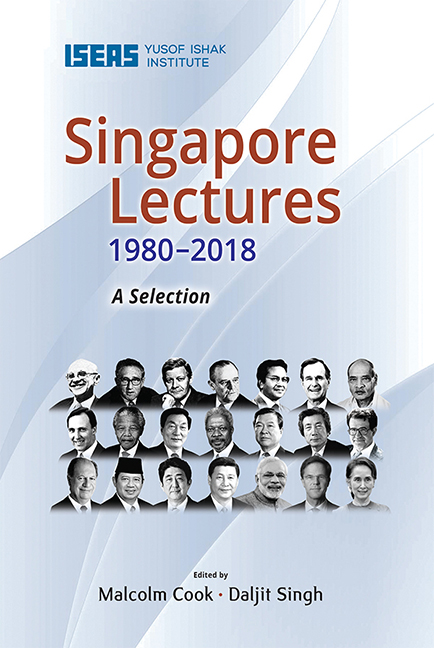Book contents
- Frontmatter
- Contents
- Introduction
- 1 The Invisible Hand in Economics and Politics
- 2 American Foreign Policy: A Global View
- 3 The Soviet Union: Challenges and Responses as Seen from the European Point of View
- 4 Trends in the International Financial System
- 5 Regionalism, Globalism and Spheres of Influence: ASEAN and the Challenge of Change into the 21st Century
- 6 US Policy in the Asia-Pacific Region: Meeting the Challenges of the Post-Cold War Era
- 7 India and the Asia-Pacific: Forging a New Relationship
- 8 Australia, Asia and the New Regionalism
- 9 South and Southern Africa into the Next Century
- 10 China and Asia in the New Century
- 11 Global Values: The United Nations and the Rule of Law in the 21st Century
- 12 Peace on the Korean Peninsula and East Asia
- 13 Japan and ASEAN in East Asia: A Sincere and Open Partnership
- 14 EU and Asia: Sharing Diversity in an Inter-regional Partnership
- 15 Global Challenges in the 21st Century: A View from Chile
- 16 Indonesia: The Challenge of Change
- 17 Japan and ASEAN, Always in Tandem: Towards a More Advantageous Win-Win Relationship through My “Three Arrows”
- 18 Forging a Strong Partnership to Enhance Prosperity of Asia
- 19 India’s Singapore Story
- 20 The Netherlands, Singapore, Our Regions, Our World: Connecting Our Common Future
- 21 Democratic Transition in Myanmar: Challenges and the Way Forward
- The Singapore Lecture Series
- The Editors
21 - Democratic Transition in Myanmar: Challenges and the Way Forward
Published online by Cambridge University Press: 09 October 2021
- Frontmatter
- Contents
- Introduction
- 1 The Invisible Hand in Economics and Politics
- 2 American Foreign Policy: A Global View
- 3 The Soviet Union: Challenges and Responses as Seen from the European Point of View
- 4 Trends in the International Financial System
- 5 Regionalism, Globalism and Spheres of Influence: ASEAN and the Challenge of Change into the 21st Century
- 6 US Policy in the Asia-Pacific Region: Meeting the Challenges of the Post-Cold War Era
- 7 India and the Asia-Pacific: Forging a New Relationship
- 8 Australia, Asia and the New Regionalism
- 9 South and Southern Africa into the Next Century
- 10 China and Asia in the New Century
- 11 Global Values: The United Nations and the Rule of Law in the 21st Century
- 12 Peace on the Korean Peninsula and East Asia
- 13 Japan and ASEAN in East Asia: A Sincere and Open Partnership
- 14 EU and Asia: Sharing Diversity in an Inter-regional Partnership
- 15 Global Challenges in the 21st Century: A View from Chile
- 16 Indonesia: The Challenge of Change
- 17 Japan and ASEAN, Always in Tandem: Towards a More Advantageous Win-Win Relationship through My “Three Arrows”
- 18 Forging a Strong Partnership to Enhance Prosperity of Asia
- 19 India’s Singapore Story
- 20 The Netherlands, Singapore, Our Regions, Our World: Connecting Our Common Future
- 21 Democratic Transition in Myanmar: Challenges and the Way Forward
- The Singapore Lecture Series
- The Editors
Summary
The 43rd Singapore Lecture was delivered on 21 August 2018 by State Counsellor of the Republic of the Union of Myanmar Daw Aung San Suu Kyi. She was introduced by Deputy Prime Minister and Coordinating Minister for National Security Teo Chee Hean. In her lecture Daw Suu, a Nobel Peace Prize laureate, outlines eloquently how Myanmar is dealing with the formidable challenges of national unity, economic development and security, including the problems in Rakhine state. She also spoke about her emphasis on improving education, infrastructure and governance.
Let me begin by congratulating the Institute of Southeast Asian Studies on its golden anniversary and by thanking the Director of the Institute for inviting me to deliver the Singapore Lecture.
I particularly appreciate the opportunity to speak here today on the challenges and objectives of our democratic transition as Singapore is the Chair of ASEAN this year. Our ASEAN friends have been generous with necessary help and support as we negotiate the passage of an intricate transition. They have demonstrated the value of regional solidarity based on shared experiences and aspirations. The premise that what helps one part helps the whole underpins the consensual, cooperative approach that has played a vital part in making ASEAN one of the most successful regional organizations in the world, despite development gaps between its member states.
A transition, to put it simply, is the process of going across from one point to another. The distance that must be covered, and the nature of the terrain that must be travelled define the scope and complexity of the challenges that have to be faced and overcome. Myanmar is crossing over from a long-established, authoritarian system to one that we label “democracy”. Our people's perception, or rather, perceptions of democracy, varied, incoherent and inconsistent as they may be, impact on the transition that our country is undergoing today.
During the last three quarters of a century, Myanmar has undergone three major transitions: from colonial rule to independence in 1948, from parliamentary democracy to military dictatorship in 1962, and still in progress today since 1988, still incomplete, is the transition from dictatorship to democracy.
- Type
- Chapter
- Information
- Singapore Lectures 1980-2018 , pp. 292 - 308Publisher: ISEAS–Yusof Ishak InstitutePrint publication year: 2020



